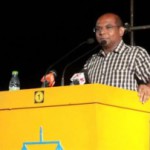Decentralising public health services will promote preventative medicine in the Maldives, President Mohamed Nasheed said today announcing that the health sector would be the first to be decentralised.
”We always hear that this hospital is lacking this machine, or that hospital is lacking doctors, or complaints that islanders cannot access adequate health facilities,” said Nasheed. ”This government’s objective is to prevent people from falling ill, because prevention is better than cure.”
At a press conference today, Nasheed said the government was trying to organise the health sector in a way that newly-elected island councilors could supervise the health sector of each island.
”We want to make sure that all persons that require special assistance are provided with that special assistance,” he said.
Islanders in at least one division have already expressed concern that many of the elected councilors were not capable of handling positions of responsibility.
One islander from the central region of the Maldives recently told Minivan News that on his island, only two of the five elected councilors had finished their GCE O’Levels.
”Because they ran as candidates for the seats under different parties, supporters of those parties have voted for them for the sake of promoting their party,” he said. ”Votes were not made with consideration for how educated the candidate is, or how capable the person, just by what political party he belongs to.”
At this morning’s press conference, Nasheed said that ministers and senior government officials from different areas including the health ministry had begun visiting different islands to conduct workshops and to provide information to the new councilors about their role in decentralising the health sector.
Addressing the concerns of the International Monetary Fund (IMF) regarding the cost of the new layer of government, expressed in a recent notice published at the conclusion of the organisation’s Article IV consultation with the Maldives, Nasheed acknowledged that “the short-term cost [of decentralisation] is likely to be high.”
The salaries alone for the island and atoll councils are expected to cost the Maldivian state an extra Rf173 million (US$13.5 million) a year, on top of the country’s 21-22 percent budget deficit.
“Although the short-term cost is high, it should be obvious to the IMF and other donors that in the long term decentralisation will reduce costs,” Nasheed said.
There was, he said, a public appetite to decentralise, which was “a cornerstone pledge” of most political parties in the country.
“It is very obvious to the government that providing services at a local level is cheaper than centrally-imposed services [with disregard] for local conditions. All over the world decentralisation is expensive to start, but highly cost efficient when it starts running.”
Nasheed also sent his condolences to the mother and family of the child who recently died during labour, forcing doctors to resort to surgery to save the mother’s life.
“We can’t say this is something that should happen, or something that we can say is right,” Nasheed said.
There was bill on medical negligence pending in parliament, he added.






Mr President, Could you please elaborate on how exactly decentralization is going to promote health promotion?
fanditha is better.
preventive medicines haaa hmmmm!! interesting